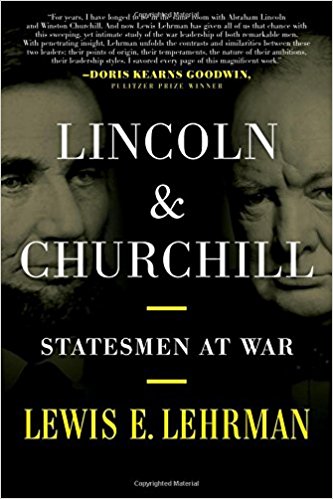
Finest Hour 180
Books, Arts, & Curiosities – The Rail-Splitter and the Bulldog

August 3, 2018
Finest Hour 180, Spring 2018
Page 44
Review by Robert A. McLain
Lewis E. Lehrman, Lincoln & Churchill: Statesmen at War, Stackpole Books, 2018, 526 pages, $34.95. ISBN: 978–0811719674
Lewis Lehrman has produced a wonderfully rendered comparison of two very different statesmen. Indeed, while the author’s recent Churchill, Roosevelt & Company related the statecraft of two closely intertwined war leaders, the juxtaposition of Lincoln and Churchill would seem a stretch, until now. Lehrman quickly points out the radically different backgrounds and personality traits of the president and the prime minister, yet he also suggests compelling historical parallels. Both leaders guided their countries to victory through essentially existential crises unprecedented in scope, the American Civil War and the Second World War. Lehrman also notes that the modest and unassuming Lincoln served as Commander-in-Chief of an army that exceeded two million men, one of the largest in history to that point, while Churchill refused to yield even as the British Empire and Commonwealth, vast but impecunious and poorly equipped, faced Hitler’s might with no outside aid following the fall of France.
One of the most valuable aspects of this work is how cogently it reveals the similarity of traits that made Lincoln and Churchill such outstanding wartime leaders. Both men possessed an aptitude for military affairs and harbored a deep understanding of history. Most critically, Lehrman documents Lincoln’s and Churchill’s shared sense of moral clarity with regard to the respective evils of American slavery and Nazism. This awareness created a determination in both leaders to see the fighting through to the end, even when defeat seemed imminent and those around them lost heart and clamored for peace, or some sort of shameful accommodation.
The two chief executives also shared great foresight. Lincoln began denouncing any Southern attempts at secession in the mid1850s. As early as 1933, Churchill started condemning the Nazi tendency towards “ferocity and war spirit,” as well as Germany’s “pitiless treatment of minorities” such as the country’s Jewish population.

2024 International Churchill Conference
The organization of Lehrman’s work illustrates the similar efforts that Lincoln and Churchill went through to fashion effective military machines from the scattershot and inadequately led forces first available to them. Lincoln went through multiple commanders before choosing a harness maker from Illinois, Ulysses S. Grant, to command the Union armies. As Lincoln saw it, Grant was one of the few generals willing to press the Confederacy unrelentingly. Churchill was also quick to dismiss officers whom he saw as ineffective, particularly in the early campaigns in the Middle East and North Africa. Lehrman suggests it was General Sir Alan Brooke, who replaced Sir John Dill as Chief of the Imperial General Staff in 1941, who best understood how to manage the relationship with the prime minister. Brooke’s intellect and stubbornness easily matched Churchill’s, with no small amount of mutual exasperation and respect.
Equally vital for effective war leadership was the ability of Lincoln and Churchill to see problems as a combination of political and military factors. Lincoln was shrewd enough to release the Confederate diplomats James Mason and John Slidell after the crew of the USS San Jacinto seized them from the British mail packet RMS Trent en route for Europe—“one war at a time,” as Lincoln put it. Churchill had the opposite problem: how to cultivate President Franklin D. Roosevelt in the hope that the immense war-making potential of the United States could be brought to bear against Germany.
In making his comparisons, Lehrman astutely shows just how large the Anglo-American relationship loomed in both conflicts. One cannot but reflect that the lives of Lincoln and Churchill might have briefly overlapped if the former had survived just a few more years. And Churchill, ever alert to his American bloodline and his own historical moment, could not help drawing a direct comparison in a 1939 speech: “All the heroism of the South could not redeem their cause from the stain of slavery, just as all the courage and skill which the Germans show in war will not free them from the reproach of Nazism, with its intolerance and its brutality.” This compelling monograph makes one wonder how the respective leaders escaped more direct comparison for so long.
Robert A. McLain is Professor of History at California State University, Fullerton and author of Gender and Violence in British India: The Road to Amritsar, 1914–1919 (2014).
Subscribe
WANT MORE?
Get the Churchill Bulletin delivered to your inbox once a month.


